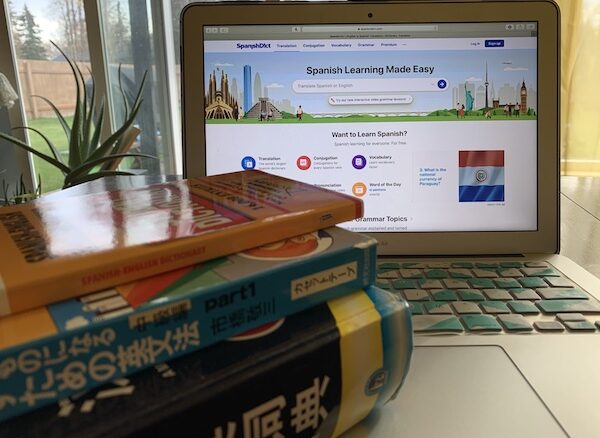
Junior Maria Chavez Mendoza recently dropped her French minor due to its increasing intensity and due to what she perceived as a lack of resources to compensate for this intensification.
Oftentimes, Mendoza — an integrated marketing communication major — said she felt distressed asking for help as the tutoring offered at the Student Success Center mainly provided help for beginning French, while the thought of approaching her teachers for assistance proved to be equally uninviting due to Mendoza’s fear of looking foolish in front of her professor.
“Instead of going to the writing center or the tutoring center at Pepperdine, I would go to my friend since she knew more or was able to be a better resource than Pepperdine was,” Mendoza said.
Although she is no longer a foreign language minor, Mendoza joined other students in hoping to see more tutoring offered in foreign languages, specifically for writing and professional language. However, faculty members in the International Studies and Languages Division expressed conflicting opinions, as they believed the small nature of language classes meant students can automatically turn to them for help.
“I’ve never even conceived of having tutoring for more advanced students because in my mind, we have small classes that you can just meet with the professor,” said Paul Begin, professor of Hispanic studies and interim associate dean of Curriculum and General Education.
Pepperdine’s undergraduate students and professors had differentiating opinions concerning students’ frequent discomfort toward utilizing their foreign language professors as resources, students’ dependence on the tutoring offered at the Student Success Center, and the lack of foreign language resources compared to other universities.
Why students don’t rely on their foreign language professors for help
It is common for college students to feel reluctant to seek academic help from their professors, despite the fact that many can benefit from the help. The top reasons why many college students find it difficult to approach their professors is due to intimidation, conflicting office hours, and fear of being perceived as stupid, William Lamers wrote in a March 2017 Faculty Focus article.
Bryn Sandine, a junior sociology major who is currently enrolled in Spanish 152, said she has never relied on her professor for help as they often felt unapproachable.
“They’re intimidating to me,” Sandine said. “I just don’t like to talk to my professors for help. I don’t want them to know that I don’t understand the material.”
Mendoza, who completed several upper-division French courses, said she also often felt hesitant to approach her professors for help, despite the supposed familiarity and small classroom size.
“It was just hard for me to officially go to them … and not try to seek answers if that makes sense,” Mendoza said. “I would go to them and I would feel bad because I’m not trying to look for the answers but [at the same time] I am.”
Pepperdine’s foreign language professors expressed their frustration concerning these barriers. Italian Studies Professor Fiona Stewart said she is eager to help, yet it is primarily upon the students to break down these barriers and simply ask.
“The access to the professor and the investment of the professor is there if the students want to take them up on it,” Stewart said. “The question is whether they will or not.”
Begin also said he thinks the problem isn’t the professors’ unapproachability, but mainly upon the students who choose not to reach out.
“Unless something’s gone really awry with that professor, [you] should be going to that professor for extra help,” Begin said. “We don’t need a tutoring center for it. The [foreign language] program is small.”
Professors’ expected versus students’ actual level of proficiency in writing and speaking
For foreign language learners, learning to write in that particular language is an extremely important skill to develop as it is a common assessment for academics and future employers to evaluate students’ expertise. However, many foreign language professors are essentially utilizing “a reductionist approach to writing” that places less importance on writing while implementing a lecture-heavy method, Azim Javadi-Safa who wrote in an article for the International Journal of Education & Literacy Studies.
Begin said he prefers to emphasize the speaking component of Spanish as he believes students are already proficient in writing.
“What occurs to me is that students need to be able to speak probably in their careers more than they’ll need to be able to write,” Begin said. “I think students need more practice speaking.”
While students felt most proficient in speaking, they often felt most uncomfortable and limited when it came to building their writing skills. Camryn Hayes, a junior French major and German minor, said she often felt nervous approaching her professors to look over her papers. She emphasized Pepperdine’s lack of resources for foreign language writing.
“Right now, we don’t really have anyone that can [help us in writing],” Hayes said. “I definitely think something focused on writing would be helpful because it’s such a big part of the world we’re in right now.”
Mendoza said she felt proficient enough in speaking and understanding French, yet expressed uncertainty in her writing skills.
“I needed so much help [in writing],” Mendoza said. “And for me personally, that was the area where I needed the most help on because speaking — it all sounds the same.”
Students’ level of dependence on online and outside resources
Some 75% of instructors believed that students were using online resources at least occasionally for the class, according to a survey done by FLTMAG — an online publication centered around the subject of foreign language education. However, student responses exceeded this number, with 85% of them saying they often relied on online resources for class.
Begin estimated that most Pepperdine students steadily utilized either the resources at the Student Success Center or sought help from their professors rather than relying on online resources.
“I suspect among lower division students, there’s probably a healthy mix of students who are going to the tutoring center and students who are trying to see their professor,” Begin said. “In upper-division classes, I’m guessing it’s all going back to the professor, which I think is appropriate.”
Pepperdine’s Student Success Center currently offers tutoring in five of the eight different foreign languages the university offers courses in: Chinese, Spanish, French, German and Italian. However, students said they rarely relied upon this resource either due to the lack of advertising or expertise available.
Justus Bell, a senior Hispanic studies major, said he primarily relied upon online resources as he never used the tutoring offered at the Student Success Center. More accurately, he’s almost never heard about it.
“I haven’t heard too much about the tutors or tutoring options [at the Student Success Center],” Bell said. “So I think it probably needs more, and if it does have adequate [resources], then I think it needs to be advertised a little bit better.”
Mendoza also said she frequently utilized online resources rather than the tutoring sessions at the Student Success Center. She said she never received any proper tutoring due to the French lessons being more oriented toward beginning French students rather than catering to both lower-division and upper-division French students.
“Sometimes the conversations [at the Student Success Center] would be pretty basic level …,” Mendoza said. “Therefore, I feel like on the level that I was at, I wasn’t getting specific tutoring to help me understand the new conjugations and the new ways that the language worked during those times.”
Comparison of Pepperdine’s resources for foreign languages to other universities
Despite students’ necessity for additional upper-division tutoring and multilingual writing resources, Pepperdine faculty believe that there are enough resources for the foreign language departments.
Stewart said Pepperdine’s resources for foreign languages are superior to those of other universities.
“We’re phenomenally well-resourced if people would access and use these resources,” Stewart said. “I’m happy with the provision. Everything you need to succeed is there.”
Marissa Davis, director of the Student Success Center, also said there are enough current resources for students to build their proficiency in foreign languages.
“As [far as] tutoring goes, I think what we have now is working pretty well so I don’t see any immediate changes happening,” Davis said.
However, other schools with smaller student populations, such as Pomona College, Claremont McKenna, Cal Lutheran University, and St. Mary’s College all offer various foreign language resources besides student tutoring.
Pepperdine possesses a larger student body than the majority of these schools, but less resources for foreign languages, according to university websites.
“I think being a small university and just having less students just kind of mixed in makes them less willing to have those programs available,” Bell said. “But at the same time, I would like to have more direct and personable help.”
Suggestions from students to improve the foreign language resources
Other than a place to receive more help in multilingual writing and professional language, students are also looking for a more casual, relaxed environment outside of the tutoring center that consistently provides support and feedback in real time for its foreign language students.
“A place where students can just come together with the express purpose with learning that language in a relaxed setting than in a classroom [would be nice],” Sandine said.
Providing students with a more diverse range of resources for its foreign language courses would promote an interactive and instrumental learning process, and express a larger commitment to foreign languages, students said
“I feel like the junior writing portfolio, the Writing Center, and the Student Success Center are just a couple of examples of where we could put in a little bit more focus for foreign languages, but it’s not there yet,” Hayes said.
Alice Han completed the reporting for this story in Jour 241 in Fall 2021 under the supervision of Dr. Christina Littlefield and Dr. Theresa de los Santos. Dr. Littlefield supervised the web version of the story.Alice Han




